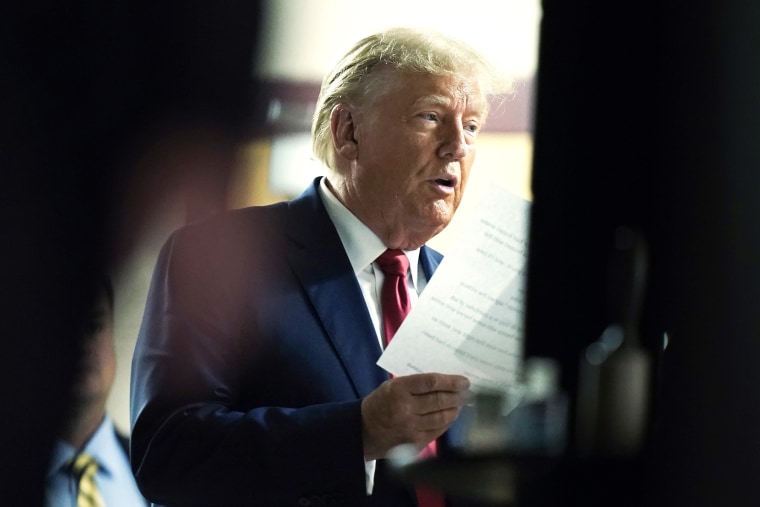Donald Trump’s best legal defense has always boiled down to one word: delay. Now, in an effort to slow down the federal criminal case involving the 2020 election, the former president has claimed that he can escape criminal prosecution because of “presidential immunity.” It’s no coincidence that this attempt to delay is being used in the fastest-approaching criminal case against him.
This argument is doomed to fail. The only question is when.
Simply put, Trump is claiming that under the legal doctrine of “presidential immunity,” he’s shielded from criminal liability for the illegal actions a grand jury says he took in his failed attempt to retain the presidency. If that sounds like it must be wrong, that’s because it is.
A president can't seek to undermine election results and thwart the peaceful transfer of power because he's president. But Trump's claim that he had presidential immunity is an argument for the opposite. This argument is doomed to fail. The only question is when it will fail. Assuming that the trial judge in this case, U.S. District Judge Tanya Chutkan, rejects this argument, Trump could then appeal her decision up to the Washington, D.C., Circuit and finally all the way up to the Supreme Court.
All of this losing and appealing could easily take months and months. The courts reviewing this argument could and should act on an expedited basis, but Trump’s endgame is obvious: postpone his federal criminal trials until he’s president once more. If he’s re-elected, Trump could maybe pardon himself or order his attorney general to try to drop the cases.
On their merits, Trump’s arguments fail for two reasons. First, the doctrine of presidential immunity is understood to extend to civil cases, not criminal ones. Second, presidential immunity applies to a president’s official acts. Trump’s attempt to thwart the peaceful transfer of power can’t be said to fall within the scope of his official responsibilities as the president.
To the first point, Trump is facing criminal prosecution and can’t attempt to bubble-wrap himself in the protective power of presidential immunity. In a still-applicable 1981 Supreme Court case that was brought by a former federal employee who attempted to sue President Richard Nixon for unlawful termination, the court ruled that presidents can’t be found liable in civil suits brought against them for acts that fall within their “official responsibility.”
The Supreme Court rationalized that presidents must be immune from liability for civil suits because they would be particularly vulnerable to being sued given the vast number of decisions they make and people they may offend and because “diversion of his energies by concern with private lawsuits would raise unique risks to the effective functioning of government.” The court was quick to point out, though, that criminal prosecutions are different. As the majority explicitly stated, the court had previously recognized that “there is a lesser public interest in actions for civil damages than, for example, in criminal prosecutions.”
Has the Supreme Court ever definitively ruled that a president can be criminally prosecuted for official acts? No. But we haven’t had a president engage in the type of behavior alleged in the federal criminal complaint against Trump. Just because a question is open doesn’t mean there’s a real issue.
In sum, the best reading of that 1981 opinion suggests that the court recognized that presidents shouldn’t be immune from criminal prosecutions, even for official acts. The public has a deep interest in ensuring that no person, even a president, can escape the criminal justice system by virtue of his or her position. It is a foundational legal principle in this country that no person is above the law.
Second, it can’t be true that the things Trump is accused of doing — trying to prevent the peaceful transfer of power by stopping the certification of the Electoral College votes and pressuring state and federal officials to change the results — fall within his official duties.
Trump’s arguments could, if taken to their logical conclusion, allow presidents to ignore acts of Congress and act on their own.
Trump has essentially argued that as leader of the executive branch, he acted in good faith to “ensure election integrity” when he spread false allegations of voter fraud and engaged in a pressure campaign aimed at getting federal and state officials to overturn the election results.
Trump’s arguments about presidential immunity could, if taken to their logical conclusion, allow presidents to ignore acts of Congress and act on their own. Or even to take over a state government’s functions. Those are arguably related to his official duties as chief executive, but they’re far outside the scope of those duties. Each amounts to a subversion of the separation of powers.
In addition, Trump’s argument that, all evidence to the contrary, he believed the election was stolen from him is to no avail. Here’s why: You can honestly believe someone is a user of illicit drugs. But you can’t tell someone to break in to that person’s car to search for the drugs. What you can do is alert the police.
In this case, if Trump honestly believed there was election fraud, he was free to file suits in court. He did and lost virtually all of them. He was free to make his arguments in the political sphere. As he did. What the law wouldn’t allow is an attempt to thwart the peaceful transfer of power.
So, despite his lawyers’ apparent arguments to the contrary, this legal question doesn’t hinge on whether Trump truly believed that the election was stolen.
Trump’s claims of presidential immunity should fail. But by bringing these arguments at all, his efforts to delay the trial may succeed. And if that were to happen, it would confirm the truth of the legal maxim “justice delayed is justice denied.”

